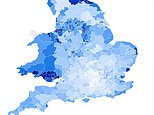Millions of pounds worth of fuel has been stolen from petrol stations in the last five years, new data shows.
A staggering 110,000 instances of drivers fleeing the pumps without paying were recorded between 2020 and 2024 as criminals pilfered an estimated £5.5million of unleaded and diesel, according to an investigation by Forecourt Trader shared with This is Money.
It also revealed the low volume of arrests made by police linked to fuel theft – also known as ‘bilking’.
The forces that responded to the probe said in 94 per cent of instances, officers fail to identify a suspect, let alone reprimanded those who drive off without paying.
Senior officers involved in these investigations heavily link the activity to organised crime gangs who use a variety of tactics to make them difficult to trace.
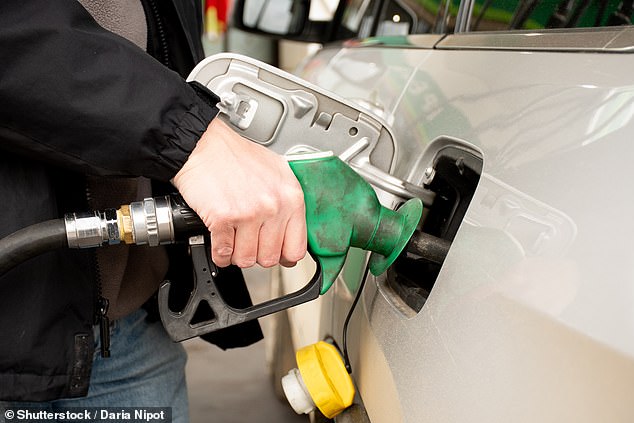
Millions of pounds worth of fuel has been stolen from UK petrol station forecourts in the last five years, an investigation has uncovered
While there is no specific offence code for robbing from fuel pumps, this criminal action falls under the wider ‘making off without payment’ banner (MOWP), which carries a maximum sentence of two years’ imprisonment.
It is also the offence type for those who make off without paying taxi drivers at the end of journeys, fail to settle a bill at a restaurant and evade payment at other businesses.
While Forecourt Trader said 31 of the nation’s 45 police forces supplied data for the number of criminals driving away from filling stations without making payment, it found constabularies take varying approaches when recording this information.
In fact, just five constabularies consistently held accounts for the value of stolen fuel in their areas.
Those that did keep a record of this information revealed that the average loss to filling stations across the last five years was £49.90 per drive off.
Nationally, it calculated that an average of 422 fuel station drive-offs are reported each week, based on the feedback collated.
It said 74,210 recorded MOWP incidents occurred at petrol stations – or involved the theft of fuel – between 2020 and 2024.
These cases saw an estimated £3.7million of petrol and diesel pumped into cars of thieves who didn’t cough up.
It then estimated that a further 35,612 MOWP offences comprised drive-offs over the same period, adding £1.78million to the value of fuel stolen.
This takes the national tally to 109,822 individual instances of petrol bilking at a total value of £5.48million.
Gordon Balmer, executive director at the Petrol Retailers Association, which represents the nation’s independent filling stations, forecourts at motorway services and supermarkets, said the issue of fuel theft has ‘persisted and worsened’ over the years.
He told This is Money: ‘Forecourt crime is getting worse, with criminals stealing from the pumps with impunity.
‘These criminals do not fear the police, because the police rarely follow up on the reported crimes, even when given the perpetrator’s license plates and CCTV footage.
‘This lack of action empowers the thieves that continue to steal from hard-working retailers.’
He added: ‘This is not a victimless crime. Many of our members run family businesses that are suffering huge losses through the Government’s failure to enforce these crimes.
‘If the authorities do not want to enforce the law, they should come out and say it. It would save our members the time and energy it takes to report crimes, only for no action to be taken.’
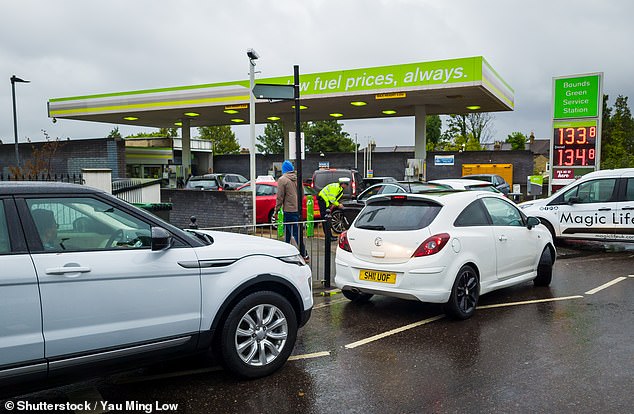
Forecourt Trader estimates that there are 422 fuel station drive-offs reported each week in the UK
Low fuel theft arrest rates
When petrol station operators notify police of a drive-off taking place, retailers said they often receive a generic text message or email within hours of logging the crime to say the perpetrator could not be identified.
One text reportedly seen by Forecourt Trader read: ‘We have not been able to identify the suspect responsible for this crime and therefore our investigation is now complete.’
In many instances the trade publication looked in to, officers failed to visit the filling station targeted to review the CCTV footage showing the suspect, their car and its registration plate.
‘As the average value of fuel taken in each drive-off is around £50, well below the £200 limit under which theft is classified as a ‘summary’ crime, these incidents have less chance of being fully investigated by police, so while drive-offs are common, arrests and prosecutions are rare – though this may be remedied by the Crime and Policing Bill currently making its way through parliament,’ Forecourt Trader said.
Sussex Police, for instance, logged 2,892 MOWPs relating to stolen fuel between 2020 and 2024. These had a calculated value loss to retailers of £144,314.
In 2,727 of these instances logged with Sussex Police – which is representative of 95 per cent of reported theft – crimes record showed ‘investigation complete: no suspect ID’ recorded against them.
A mere 37 incidents resulted in an offender being charged or summonsed, while a further eight people were cautioned and four ordered to do community service.
The Metropolitan Police held record of 15,787 MOWP offences taking place at filling stations over the five-year spell, with fuel worth around £788,000 stolen.
Humberside Police also logged 3,008 instances of motorists making off without paying for petrol or diesel, which cost retailers an estimated £150,102.
In 83 per cent (2,489) of these reports, no suspect was identified.
‘A further 200 cases saw ‘named suspect but evidential difficulties CPS and Police’ recorded against them, while investigations by Humberside officers brought about 73 community resolutions, and saw people charged or summoned to court 115 times, equivalent to 3.8 per cent of cases,’ Forecourt Trader said.
South Yorkshire filling stations were subject to 3,483 MOWPs (estimated to be worth £173,805) but only 1.2 per cent (43 cases) of police investigations saw an offender charged – police listed 91 per cent of instances as having no suspect.
West Yorkshire Police recorded a massive 8,780 fuel thefts amounting to an estimated 438,131 over the same period. Less than nine in ten (86 per cent) saw police identify a suspect.
Hertfordshire Police and Leicestershire Police – recording 6,749 (estimated at £336,782) and 4,549 (estimate value of £227,000) MOWPs respectively – didn’t find a suspect in 92 per cent of reported cases.
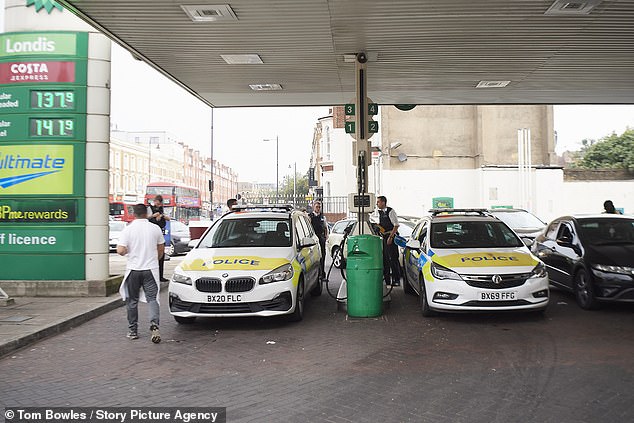
Gordon Balmer, executive director at the Petrol Retailers Association, said the issue of fuel theft has ‘persisted and worsened’ over the years
When asked about low prosecution rates for fuel theft, the Association of Police and Crime Commissioner told Forecourt Trader that the vast majority of instances were ‘linked to other serious organised criminality’.
However, the APCC added that police forces should not ‘be complacent about these crimes because they are not victimless or low-level, as is sometimes suggested’.
A spokesperson for the National Police Chiefs’ Council also responded to the investigation.
‘Forces have regular interactions with commercial providers and organisations, including petrol stations, about the security of their sites and continue to work with them to make it harder for criminals to commit this type of offence,’ they said.
‘In some cases, there may not be enough intelligence or data for police to act on.
‘This does not mean that a crime is closed indefinitely or that intelligence or information is ignored.
‘Intelligence is vital in detecting organised criminality, and we would encourage anyone who suspects criminality in their community to report it to police, including theft.’
The RAC Foundation in 2023 reported that instances of bilking had risen 362 per cent compared to before the pandemic.
But while it said that the increase might partly be linked to the cost-of-living squeeze and a surge in shoplifting, it also said it was a sign of ‘more systematic criminal activity’, suggesting organised gangs are the main perpetrators.
‘The message to anyone tempted to bilk the service station must be ‘don’t fill up if you can’t pay up’ because getting caught is a real possibility, and financial losses to companies ultimately lead to higher prices for us all,’ said Steve Gooding, director at the transport policy organisation.
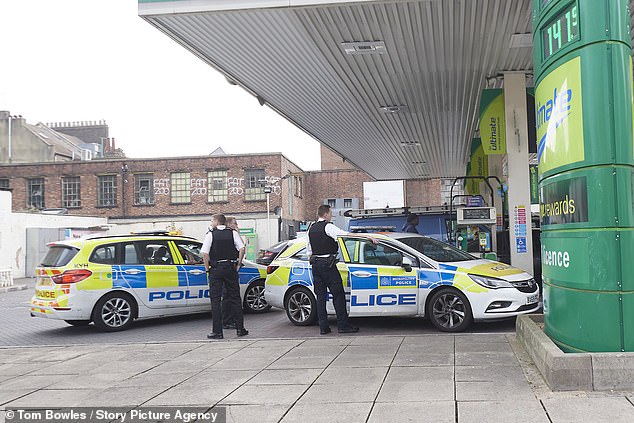
These are the tactics used by organised crime gangs to steal petrol and diesel – and why the police is struggling to get a grip on these repeat offenders
Tactics used by criminal gangs to steal almost £1m of fuel a year
Forecourts are enforced by security systems policed by ANPR (automatic number plate recognition) cameras provided by companies including Forecourt Eye, Vars Technology and Big Brother.
They include a blacklist database of vehicles that alerts retailers when a car associated with drive-offs enters a petrol station, and also helps forecourts recover money from unpaid fuel.
Data supplied by Vars Technology indicates that around 13 per cent of all drive-offs involved motors using cloned numberplates from a vehicle of similar make, age and colour, as well as fake registration number combinations, or cars with no registered keepers.
Cross-referenced with the DVLA’s database, Vars found that 5,449 vehicles with cloned plates and 902 with fake registrations, together with 3,303 vehicles with no registered keeper, were used for MOWPs in 2024 alone.
John Garnett, a director at Vars Technology, told Forecourt Trader that offenders are rarely caught because ‘police forces are under-resourced and under-funded’.






